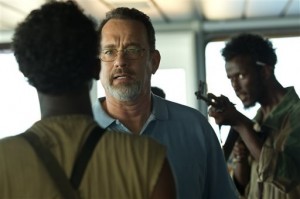In April 2009, four Somali pirates seized the Maersk Alabama, an American cargo ship, and took its crew of 20 unarmed members and Captain Richard Phillips hostage. After the crew members regained control of the ship, the pirates seized Phillips, forcing him into a lifeboat and seeking ransom. For several days, they negotiated with the American government for money in exchange for Phillips’s safe return, but instead, their piracy led to a massive rescue operation by the U.S. Navy and SEAL Team Six.
In The New York Times’ original story of the attack, the situation was described as “an episode that at times seemed ripped from the pages of a Robert Louis Stevenson novel.” The incredible story and scale of the rescue not only seemed fit for a novel, but for a Hollywood movie as well.
With Tom Hanks at the helm, the terrifying true story is turned into a box office hit, “Captain Phillips.” The movie is done extremely well and leaves its audience tense throughout, but it was surrounded by controversy.

According to the original story of the hijacking in the Times, “piracy is a multimillion-dollar business in Somalia, a nation that has limped along since 1991 without a functioning central government.” While Paul Greengrass, the director of the film, did give the pirates a chance to explain why they hijack ships, many noted that this was not enough social commentary to make for a fair evaluation. Rather, the film warranted a better explanation of why piracy is such a popular and embedded industry for Somalis.
The other controversy surrounding the film was that many of the ship’s crew members called the film a lie. According to the New York Post, the crew had begged for the real-life Phillips not to sail so close to the shore, but he wanted to show that he was not afraid of any pirates. Eleven of the crew members sued Maersk Line and the Waterman Steamship Corporation for almost $50 million because of the unnecessary danger they were put in.
Setting aside any qualms people might have about the movie, the story itself is a gripping one. More importantly, the heroic rescue effort of Captain Phillips, the crew members and the Navy should not go unnoticed.
“Captain Phillips” is a masterfully done film with yet another strong performance by Hanks. But what might be even more impressive than Hanks’s acting was that of Somali native and Minneapolis resident Barkhad Adbi. Performing in his first role, Adbi plays Muse, the pirates’ leader. In one of the most pivotal and impactful moments of the movie, Adbi’s character stares at the captain, whom he nicknames Irish, and commands, “Look at me. Look at me. I’m the captain now.” Showing the skills of a mature actor, much like his co-star Hanks, Adbi ad-libbed “I’m the captain now,” which was the most chilling line of the movie.
There is Oscar buzz for Best Picture, but it is the intense acting by Hanks and Adbi that really keeps the movie enthralling and that makes them the best chance for this movie to be awarded at least one Oscar.
“Captain Phillips” is a riveting story that was translated beautifully onto the big screen. Its actors show raw emotion throughout, which allows for audiences to see just how quick a person can think and how much strength a person can muster when thrown into a perilous situation.






